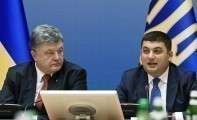Дерипаска предложил Конгрессу США дать показания
Олег Дерипаска был готов дать показания в конгрессе США в рамках комитетских расследований «российского вмешательства» в выборы в обмен на неподсудность. Об этом сообщает газета New York Times.
NYT называет Дерипаску членом «близкого окружения» Владимира Путина и пишет, ссылаясь на мнения трех анонимных источников в Конгрессе, что Дерипаска готов был отвечать на вопросы комитета по безопасности. Но в качестве условия выставил требование предоставить ему иммунитет от судебного преследования.
По информации издания, спецкомитет по разведке Палаты представителей отказал Дерипаске из-за опасений, что это может создать сложности для сотрудников ФБР, которые расследуют связи президента США Дональда Трампа с Россией.
Ранее агентство Associated Press (AP) сообщало, что руководитель предвыборного штаба Трампа Пол Манафорт тайно работал на Олега Дерипаску более 10 лет назад и занимался продвижением интересов российских властей. Дерипаска опроверг эти сведения, выкупив для этого рекламную полосу в The Wall Street Journal.
Затем бизнесмен подал в суд на агентство за публикацию. Текст AP о себе Дерипаска назвал «частью антироссийской кампании американских СМИ». Иск был подан 15 мая, он будет рассматриваться в суде Вашингтона. Интересы бизнесмена представляет известная американская юридическая компания Boies Schiller.
Инвестиции Олега Дерипаски в США
В своей New York Times так же приводит данные об инвестициях Олега Дерипаски в США. Как пишет издание, ссылаясь на материалы одного из судебных дел, Дерипаска за последние десять лет приобрел ряд активов в Соединенных Штатах, действуя через трасты, зарегистрированные на Британских Виргинских островах.
В частности, NYT утверждает, что в 2006 году в интересах Дерипаски за $5,4 млн был приобретен комплекс жилой недвижимости Greenwich Village в Манхэттене (Нью-Йорк). Еще одно здание в Верхнем Ист-Сайде (Нью-Йорк) было приобретено в 2008 году за $42,5 млн. А в 2014 году Дерипаска, как пишет издание, купил долю в 50% в газете «В Новом Свете», крупнейшем русскоязычном издании США.
Комментариев Олега Дерипаски или его представителей по изложенным сведениям New York Times не приводит.
За «клевету» ответят: Дерипаска подал в суд на Associated Press
Агентство утверждало, что Манафорт работал на российского миллиардера для продвижения интересов Владимира Путина
Миллиардер Олег Дерипаска подал в суд на Associated Press (AP), он обвиняет агентство в клевете, сообщает Politico со ссылкой на заявление. В «Базовом элементе», принадлежащем бизнесмену, Forbes подтвердили факт подачи иска.
Иск был подан 15 мая, он будет рассматриваться в суде Вашингтона. Интересы бизнесмена будет представлять известная американская юридическая компания Boies Schiller.
Недовольство предпринимателя вызвала статья журналистов AP Джеффа Хорвица и Чада Дея от 22 марта, где говорилось, что Дерипаска в течение пяти лет выплатил $50 млн бывшему руководителю предвыборного штаба Дональда Трампа Полу Манафорту.
«Пол Манафорт тайно работал на российского миллиардера для продвижения интересов президента России Владимира Путина», — утверждалось в публикации. По информации агентства, в 2006 году Манафорт подписал контракт, по которому выплачивалось по $10 млн в год. Контракт действовал по крайней мере до 2009 года.
Манафорт подтвердил AP, что он работал на Дерипаску, но сообщил, что его работу было бы несправедливо оценивать как незаконную.
В иске говорится, что статья создала ложное впечатление о том, что отношения Дерипаски с Манафортом были связаны с предвыборной кампанией Дональда Трампа, и что Дерипаска связан с продолжающимися расследованиями предполагаемого хищения активов из Украины после свержения президента Виктора Януковича в 2014 году. «Господин Дерипаска не производил никаких выплат господину Манафорту, чтобы подорвать демократические движения», — утверждается в заявлении.
Манафорт руководил избирательным штабом Трампа несколько месяцев. Его отстранили от должности после того, как власти Украины обвинили его в том, что он, будучи советником Януковича в 2007-2012 годах, получил от его администрации почти $13 млн и помог Партии регионов вывести в США минимум $2,2 млн.
Russian Once Tied to Trump Aide Seeks Immunity to Cooperate With Congress
The court documents and public records show that Mr. Deripaska, whose companies have long had offices in New York, has expanded his American holdings over the past 10 years, buying high-priced Manhattan townhouses and a major stake in a Russian-language newspaper in New York.
The lawsuit was brought by Alexander Gliklad, a Russian-born businessman, who charged that Mr. Deripaska had used his diplomatic status as a cover to do business, which the oligarch denied. Mr. Gliklad claims he is entitled to collect funds that Mr. Deripaska had agreed to pay to settle a lawsuit with a man who owed Mr. Gliklad money from a court judgment. Last month, a New York State Supreme Court justice rejected Mr. Gliklad’s argument that the Manhattan court had jurisdiction over Mr. Deripaska.
As Mr. Manafort’s dealings with Russia-friendly Ukrainian politicians, business activities and loans have come under examination in recent months, his former client has gotten caught up in the media scrutiny. The two men were partners in an offshore fund set up in 2007 to buy telecommunications and cable television assets in Ukraine, where Mr. Manafort had advised then-President Viktor F. Yanukovych. That deal fell apart, winding up in litigation in the Cayman Islands.
In March, Mr. Deripaska took out newspaper ads stating that he was willing to participate in hearings before Congress after The Associated Press published a report alleging that Mr. Manafort had provided him with a plan in 2005 outlining steps to “greatly benefit the Putin government,” by influencing politics and news coverage in the United States. Mr. Deripaska has denied ever entering into such an arrangement and sued The A.P. for libel last month. The news organization has said it stands by its article. Mr. Manafort has denied that his work for the oligarch was aimed at aiding the Russian government.
There are no indications thus far that the F.B.I. is seeking to interview Mr. Deripaska as part of the continuing investigation into Russian interference in the presidential election.
Lawyers at the firm representing Mr. Deripaska in the libel action did not respond to a request for comment about his offer to cooperate with congressional investigators. Adam Waldman, a Washington lobbyist representing Mr. Deripaska, did not respond to an email seeking comment.
For years, Mr. Putin complained about the State Department’s refusal to issue Mr. Deripaska a visa. “They give us nothing, explain to us nothing, and forbid him from entry,” Mr. Putin told the French newspaper Le Monde in 2008.
It is considered difficult to deny diplomatic visas to people carrying the proper credentials issued by their own countries. A State Department spokesman, William B. Cocks, said he could not discuss individual visa issues, citing confidentiality. But speaking generally, he said diplomats coming to the United States received a special visa while foreigners doing business in this country needed a business visa.
The timing of Mr. Deripaska’s diplomatic visits to the United States are notable because they began after the F.B.I. withdrew from a secret deal that allowed him into the country. In 2008, the F.B.I., over State Department objections, arranged for him to receive a special visa after he agreed to help the bureau find a retired agent, Robert Levinson, who had disappeared in Iran the year before. F.B.I. officials ended the deal in 2009 after concluding that the arrangement was not fruitful, according to former officials at the bureau.
He sought to get a visa in 2015 to testify in the Manhattan court case, according to court filings, but the State Department refused to issue him one.
Mr. Deripaska, whose net worth has been estimated at $5.3 billion by Forbes, has global business interests and sits atop a number of companies, including United Company Rusal and Basic Element, which includes businesses ranging from agriculture to aviation to automobiles.
According to filings in the Manhattan lawsuit, Mr. Deripaska’s investments in the United States over the past decade include two Manhattan townhouses bought through shell companies owned by a British Virgin Islands trust. Records show one of those properties, in Greenwich Village, was purchased in 2006 for $4.5 million; the other building, on the Upper East Side, was bought two years later for $42.5 million. In 2014, he acquired a 50 percent stake in the largest Russian-language newspaper in the United States, V Novom Svete, or In The New World, located in Lower Manhattan, court filings state.
He also agreed to “support” a hedge fund run by the former president of the World Bank, James Wolfensohn, by investing in it through an offshore shell company, according to one filing. Through his assistant, Mr. Wolfensohn declined to comment. A spokesman in Moscow for one of Mr. Deripaska’s companies did not respond to questions about the business dealings.
Топ










































































































































































































































































































































